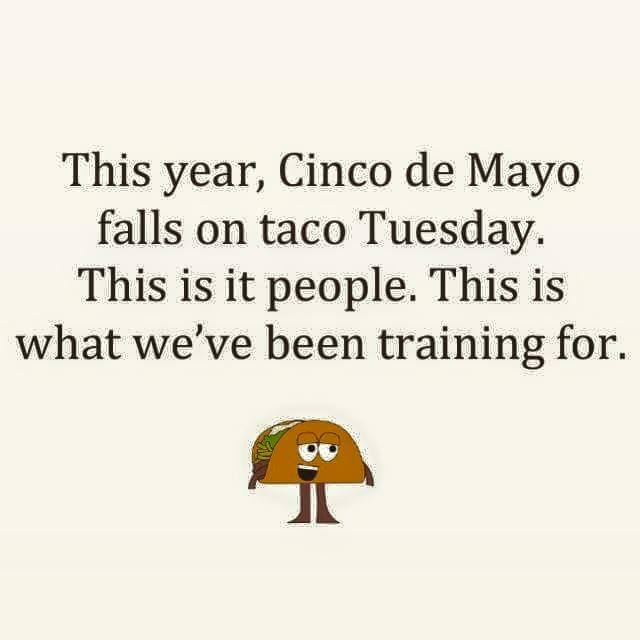Topic Tuesday #146 2015/05/05 "Cinco de Mayo"
After "May the 4th be with you" is "Revenge of the 5th," more commonly known as Cinco de Mayo. As I like to do with Topic Tuesdays is to examine a holiday that falls on or near the Tuesday posting. So today being the auspicious day of the 5th of May, the When, What, Where, Why, and How - will be examined.
When: Obviously the 5th of May, but it commemorates a battle fought in 1862.
Because American's don't know any better.
What: It is the celebration of an unlikely victory over French forces by the Mexican army at the Battle of Puebla on May 5, 1862, under the leadership of General Ignacio Zaragoza Seguín. Regionally in Mexico, primarily in the state of Puebla the celebration is called El Día de la Batalla de Puebla (English: Battle of Puebla Day). IN the USA it is an immensely popular celebration of Mexican culture, and has little or nothing to do with the origin of the holiday.
Where: 19°02′N 98°11′W The battle occurred near enough to Puebla to garner its namesake. Puebla is located southeast of Mexico City and west of Mexico's main Atlantic port, Veracruz, on the main route between the two in Central Mexico.
Why: In short, a little thing called the French intervention in Mexico. After a new president was elected in 1861 after a civil war, which you can look up under the name The Reform War. The civil war had caused sever debt to the nation. The new president opted to suspend payment of the debt to Spain, France, and Britain. They were displeased and formed the Tripartite Alliance, with the main purpose of launching an allied invasion of Mexico, forcing the Mexican government to negotiate terms for repaying its debts and for reparations for alleged harm to foreign citizens in Mexico. The Tripartite Alliance fell apart by early April 1862, when it became clear the French had grander ambitions than simple debt repayment. The British and Spanish withdrew, leaving the French to march alone on Mexico City.
How: The Battle of Puebla delayed the French forces from making their way to Mexico City. The French expeditionary force was led by General Charles de Lorencez. Lorencez was led to believe that the people of Puebla were friendly to the French, and that the Mexican Republican garrison which kept the people in line would be overrun by the population once he made a show of force. This would prove to be a serious miscalculation on Lorencez's part.
Mexican Commander General, Ignacio Zaragoza Seguín, had earlier retreated to Puebla which was heavily fortified – it had been held by the Mexican government since the Reform War. To its north stood the forts Loreto and Guadalupe on opposite hilltops. Zaragoza had a trench dug to join the forts via the saddle.
Lorencez decided to attack Puebla from the north. However, he started his attack a little too late in the day, using his artillery just before noon and by noon advancing his infantry. By the third attack the French required the full engagement of all their reserves. The French artillery had run out of ammunition, so the third infantry attack went unsupported. The Mexican forces and the Republican garrison both put up a stout defense and even took to the field to defend the positions between the hilltop forts.
As the French retreated from their final assault, Zaragoza had his cavalry attack them from the right and left while troops concealed along the road pivoted out to flank them. By 3 p.m. the daily rains had started, making a slippery quagmire of the battlefield. Lorencez withdrew to distant positions, counting 462 of his men killed against only 83 of the Mexicans. He waited a couple of days for Zaragoza to attack again, but Zaragoza held his ground. Lorencez then completely withdrew to Orizaba.
Slowed by their loss at Puebla, the French forces retreated and regrouped, and the invasion continued after Napoleon III determinedly sent additional troops to Mexico. The French were eventually victorious, winning the Second Battle of Puebla on 17 May 1863 and pushing on to Mexico City. When the capital fell, Juárez's government was forced into exile in the remote north. With the backing of France, the Habsburg Archduke Maximilian became Emperor of Mexico in the short-lived Second Mexican Empire. - But that is a story for another day.
On 9 May 1862, President Juárez declared that the anniversary of the Battle of Puebla would be a national holiday, regarded as "Battle of Puebla Day" or "Battle of Cinco de Mayo". Although today it is recognized in some countries as a day of Mexican heritage celebration, it is not a federal holiday in Mexico.


